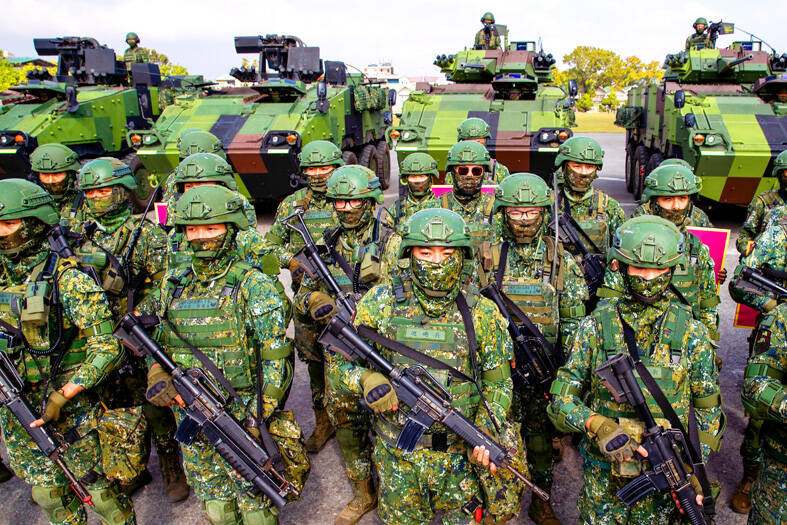Washington has expanded the training of Taiwanese troops by members of the US National Guard, the Nikkei Asia wrote in an exclusive report yesterday, citing anonymous sources familiar with the matter.
The expansion came after National Guard training programs helped Ukrainian forces repel a Russian invasion of the country, the Japanese newspaper wrote.
The National Guard is a strategic reserve force that is normally governed by US state governments and is called up to respond to natural disasters or civil unrest.

Photo: Ritchie B. Tongo, EPA-EFE
However, US law also allows it to be deployed by the US government.
President Tsai Ing-wen (蔡英文) in May last year unveiled plans for training programs under the National Guard, saying during a visit to Taipei by US Senator Tammy Duckworth that the US Department of Defense is “proactively planning cooperation between the US National Guard and Taiwan’s defense forces.”
Citing sources directly involved in the joint training program, the Nikkei reported that the National Guard started training Taiwanese forces before Tsai’s announcement, adding that some of the personnel had been dispatched to Taiwan from Hawaii.
The National Guard runs training programs involving military units from about 80 countries worldwide, mostly under the US State Partnership Program (SPP). The training differs from country to country and can include infantry tactics, air operations, cyberdefense, disaster response, counterterrorism and medical support. The training involving Taiwanese forces is not under the SPP.
Under the program, nations’ troops mostly cooperate with the National Guard from only one state, while the training in Taiwan involves personnel from multiple states, the Nikkei cited a source as saying.
Taiwan also has more training options than countries participating in the SPP, they said.
“We don’t have a comment on specific operations, engagements or training, but I would highlight that our support for, and defense relationship with, Taiwan remains aligned against the current threat posed by the People’s Republic of China,” the report quoted a Pentagon spokesperson as saying.
“Our commitment to Taiwan is rock-solid and contributes to the maintenance of peace and stability across the Taiwan Strait and within the region,” they said.
“Increased training through a partnership between Taiwan’s military and the US National Guard is, if confirmed, a significant step and one that has been talked about in Washington for a while,” the report quoted Jacob Stokes, a senior fellow at the Center for a New American Security think tank, as saying.
“US National Guard training would likely be focused on improving Taiwan’s ability to leverage its reserve forces to greater effect in support of a whole-of-society military mobilization plan,” he said.
The Wall Street Journal in October 2021 reported that US special operations forces had been deployed to Taiwan for at least a year to conduct small-unit tactics training with the Taiwanese military.
Separately, the Chinese-language Liberty Times (the Taipei Times’ sister newspaper) on Jan. 3 reported that Taiwan expects to broaden its cooperation with the National Guard on training, tactics and individual combat skills, as the nation resumes one-year conscription, citing an anonymous source.

The CIA has a message for Chinese government officials worried about their place in Chinese President Xi Jinping’s (習近平) government: Come work with us. The agency released two Mandarin-language videos on social media on Thursday inviting disgruntled officials to contact the CIA. The recruitment videos posted on YouTube and X racked up more than 5 million views combined in their first day. The outreach comes as CIA Director John Ratcliffe has vowed to boost the agency’s use of intelligence from human sources and its focus on China, which has recently targeted US officials with its own espionage operations. The videos are “aimed at

STEADFAST FRIEND: The bills encourage increased Taiwan-US engagement and address China’s distortion of UN Resolution 2758 to isolate Taiwan internationally The Presidential Office yesterday thanked the US House of Representatives for unanimously passing two Taiwan-related bills highlighting its solid support for Taiwan’s democracy and global participation, and for deepening bilateral relations. One of the bills, the Taiwan Assurance Implementation Act, requires the US Department of State to periodically review its guidelines for engagement with Taiwan, and report to the US Congress on the guidelines and plans to lift self-imposed limitations on US-Taiwan engagement. The other bill is the Taiwan International Solidarity Act, which clarifies that UN Resolution 2758 does not address the issue of the representation of Taiwan or its people in

US Indo-Pacific Commander Admiral Samuel Paparo on Friday expressed concern over the rate at which China is diversifying its military exercises, the Financial Times (FT) reported on Saturday. “The rates of change on the depth and breadth of their exercises is the one non-linear effect that I’ve seen in the last year that wakes me up at night or keeps me up at night,” Paparo was quoted by FT as saying while attending the annual Sedona Forum at the McCain Institute in Arizona. Paparo also expressed concern over the speed with which China was expanding its military. While the US

SHIFT: Taiwan’s better-than-expected first-quarter GDP and signs of weakness in the US have driven global capital back to emerging markets, the central bank head said The central bank yesterday blamed market speculation for the steep rise in the local currency, and urged exporters and financial institutions to stay calm and stop panic sell-offs to avoid hurting their own profitability. The nation’s top monetary policymaker said that it would step in, if necessary, to maintain order and stability in the foreign exchange market. The remarks came as the NT dollar yesterday closed up NT$0.919 to NT$30.145 against the US dollar in Taipei trading, after rising as high as NT$29.59 in intraday trading. The local currency has surged 5.85 percent against the greenback over the past two sessions, central